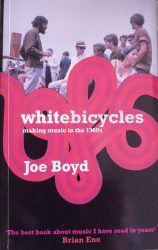 We’ve read several books that show America looking at itself, so what about an American who spent a lot of time involved with the music scene on the right-hand side of the pond?
We’ve read several books that show America looking at itself, so what about an American who spent a lot of time involved with the music scene on the right-hand side of the pond?
In the last chapter of his memoir, Joe Boyd describes himself as being an “éminence grise”. From this, you get the feeling that it is the business of music that interests him, as much as the artistry. The book comes alive when he’s talking about touring Europe with blues packages for impresario George Wein and running the UFO club in the mid-sixties. Talking about the Bob Dylan performance at the 1965 Newport Folk Festival, and the horror of the organisers at seeing electric guitars on stage, the emphasis is on the effect on the audience and revenues rather than the impact of a world-changing musical event.
While the book does progress through time in a fairly straightforward fashion, each chapter can be read in isolation, meaning you can learn about his work touring with some Jazz and Blues greats, Muddy Waters, Coleman Hawkins, Duke Ellington and Thelonious Monk, amongst others, if that’s what interests you. That structure does leave a few moments where important people drift in an out of shot quickly. Dave Robinson, later founder of Stiff Records, appears as one of the instigators of the UFO club and then vanishes again a page or so later. Where ‘White Bicycles’ scores highest is as social history rather than a music memoir. His time with the Watersons, in 1963, paints a vivid picture of the early stirrings of the sixties folk boom, and he captures the 1966 London Underground scene better than anything else I’ve read or seen.
Boyd talks in detail about some of the people, Nick Drake, Sandy Denny and Fairport Convention, The Incredible String Band, and Norma Waterson. Of these, it is clearly Nick Drake, who he regards as the greatest talent he ever “discovered”, who gets the most affectionate portrait. But even there it is the business aspects and getting Drake’s music “out there” that inspires Boyd. Pink Floyd are talked of very much as a commodity, and for me at least he seems unsympathetic to Syd Barrett’s obvious problems.
You can’t get away from the fact that Joe Boyd is responsible for producing and delivering, to the music buying public, some of the greatest music of the 1960s. It’s debatable whether Pink Floyd or Fairport Convention would have succeeded without him. He doesn’t duck from showing his frustrations with The Incredible String Band, and their seeming willingness to destroy their own careers, and their eventual drift into Scientology. Elsewhere, his former charges have not always been complimentary about him and his role in their careers. Certainly, for an éminence grise his production company, Witchseason, seems to have been less than adequately managed. Putting a clause, in the eventual sale of its catalogue to Island, that Drake’s albums were never to be deleted was what led to his rediscovery in the 90s and may be Boyd’s best business negotiation ever.
This is a very “American” book. However long he spends in Europe, he never entirely gets the natives. He shakes his head in disbelief at John “Hoppy” Hopkins’ casual approach to the business of UFO, where in the less hard-nosed world of England in the sixties nothing seems amiss. In a book about business relationships that starts with Jac Holzman of Elektra Records sending him to establish a London office, he ends with a return to the States to manage film music for Warner Brothers.
His writing style has been criticised as a bit pompous and self-important, but it’s his story told his way. I for one enjoyed it more reading it the second time, because I read it as a book about the music business rather than looking for a book about the artists and their music. America made music a business long before the UK, and Boyd was one of the key figures in bringing the American work ethic to our music industry. So, his story is an important one, as there simply wouldn’t have been a British figure who could have done what Boyd did for his artists. Chris Blackwell, who he worked closely with, acknowledges the debt to Boyd’s work in his own recent book. Later industry figures like Trevor Horn, Tony Stratton-Smith, or Richard Branson, may or may not appreciate the influence of Boyd on their businesses but it is clear when you read about them that, without Joe Boyd, the British music industry would have been a very different beast.
It’s the music that counts, so a few of Joe Boyd’s best productions to remind us that he was about the songs as well as the business.



Thanks has the book been updated ? My copy is from 2006 . There was also a CD issued White bicycles 23 tracks of Joe Boyd productions.
As far as I know it is still the same edition on sale. The CD was interesting, but a bit pick and mix, might have been better if it focused on the Witchseason productions…